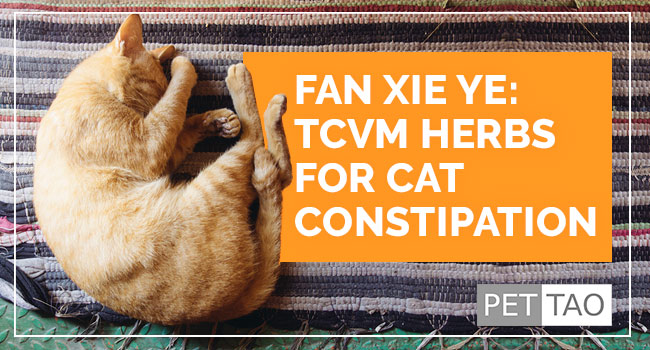Looking for a Natural Remedy for Cat Constipation?
If you’re looking for something natural to help cat constipation, Fan Xie Ye just might help!
Life is miserable for everyone when there’s a constipated kitty in the home.
Signs include straining in the litterbox, crying, and little accidents around the house.
Painful for kitty, and troubling for you.
When cats have trouble defecating, it’s called constipation.
If left treated, constipation may progress to megacolon.
In megacolon, prolonged feces retention stretches and damages the colon muscles.
Fecal matter can no longer move through properly.
Causes of Cat Constipation
Constipation is a clinical sign. It may or may not have a disease cause.
Dehydration is the most common cause of cat constipation.
Common causes include:
- Arthritis
- Certain drugs
- Dehydration
- Lack of exercise
- Metabolic disease
- Nerve damage
- Obstruction
- Painful defecation
- Stress
- Trauma
- Tumors
Symptoms of Cat Constipation
Your cat might be constipated without you being aware of the situation.
Pay attention and keep an eye out for the symptoms.
Symptoms include:
- Defecating outside the litterbox
- Depression
- Infrequent or no defecation
- Hard, dry feces
- Loss of appetite
- Small quantities of feces
- Straining to defecate
- Vomiting
Western Diagnosis and Treatment of Cat Constipation
If your cat suffers from constipation, you should see your vet.
Your vet might be able to diagnose constipation by feeling your cat’s abdomen.
If your cat is overweight, your vet might need to do x-rays to see what’s going on.
Some cats need an endoscopy to check for tumors or structural abnormalities.
Vets often recommend bloodwork to check for diseases causing dehydration leading to constipation.
With mild constipation, most vets recommend adding fiber to the diet.
Some cats suffer constipation because of underlying disease causing dehydration.
A good example is a renal failure.
For cats with an underlying disease cause, subcutaneous fluids usually help.
How Fan Xie Ye Eases Cat Constipation
Luckily, Traditional Chinese Veterinary Medicine (TCVM) offers a convenient solution.
Just add Fan Xie Ye to your cat’s food!
Fan Xie Ye: Western Philosophy
Fan Xie Ye helps cats suffering from:
- Abdominal pain
- Constipation
- Impaction
Fan Xie Ye: Eastern Philosophy
Eastern medicine treats a disease’s root cause(s) rather than alleviating symptoms.
Accordingly, TCVM veterinarians evaluate canine constipation differently than Western veterinarians.
TCVM vets look for signs of imbalance.
Fan Xie Ye helps cats with the following TCVM signs:
- Abdominal fullness
- A red or pale tongue
- Excessively strong or weak pulse
- Focal distension
- Lower intestinal stagnation
- Small, hard stools
How Fan Xie Ye Works
Fan Xie Ye is a single-herb TCVM formula to help cats suffering from constipation.
The underlying cause of any disease is always an imbalance somewhere in the body.
How Does Fan Xie Ye Help Cat Constipation?
Fan Xie Ye alleviates your cat’s imbalances while treating the symptom of constipation.
According to Traditional Chinese Medicine, Fan Xie Ye works by:
- Purging the large intestine
- Resolving food stasis
- Clearing heat
Dr. Huisheng Xie, the founder of the Chi Institute in Reddick, FL, recommends Fan Xie Ye specifically for animals.
Fan Xie Ye works best when combined with plenty of water, Eastern Food Therapy, and moderate exercise.
Note: Information on this site is for educational purposes only and is not meant to substitute the advice provided by your own veterinarian.
Get TCVM Herbal Formulas as TCVM Pet Supply
Note: Information on our website is for educational purposes only and not meant to take the place of your veterinarian’s advice.








